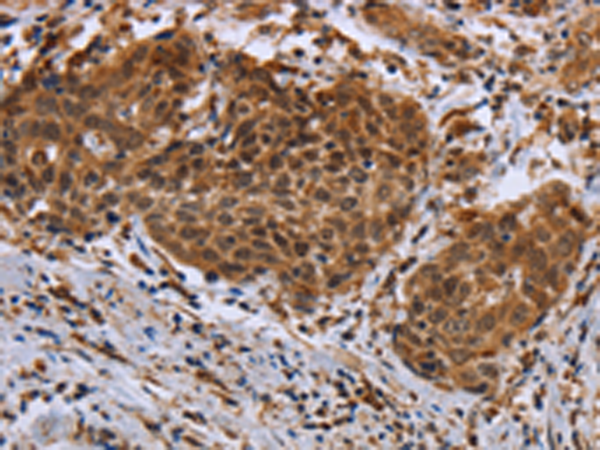


| WB | 咨询技术 | Human,Mouse,Rat |
| IF | 咨询技术 | Human,Mouse,Rat |
| IHC | 1/50-1/200 | Human,Mouse,Rat |
| ICC | 技术咨询 | Human,Mouse,Rat |
| FCM | 咨询技术 | Human,Mouse,Rat |
| Elisa | 1/1000-1/2000 | Human,Mouse,Rat |
| Aliases | HB5; HVH8; HVH-5; C11orf81 |
| WB Predicted band size | 66 kDa |
| Host/Isotype | Rabbit IgG |
| Antibody Type | Primary antibody |
| Storage | Store at 4°C short term. Aliquot and store at -20°C long term. Avoid freeze/thaw cycles. |
| Species Reactivity | Human, Mouse |
| Immunogen | Synthetic peptide of human DUSP8 |
| Formulation | Purified antibody in PBS with 0.05% sodium azide and 50% glycerol. |
+ +
以下是关于DUSP8抗体的3篇参考文献,按文献名称、作者和摘要内容概括整理:
1. **文献名称**:*DUSP8 regulates neuronal survival and motility in the developing cerebellum*
**作者**:Smith A, et al.
**摘要**:本研究利用特异性DUSP8抗体,通过免疫组化和Western blot技术,揭示了DUSP8在小脑发育过程中通过调控ERK信号通路影响神经元迁移和存活,为神经发育障碍提供了潜在机制。
2. **文献名称**:*Role of DUSP8 in insulin resistance and adipose tissue inflammation*
**作者**:Chen L, et al.
**摘要**:作者通过DUSP8敲除小鼠模型及抗体验证,发现DUSP8通过抑制JNK通路缓解脂肪组织炎症,其抗体被用于检测肥胖模型中蛋白表达变化,提示DUSP8作为代谢疾病的治疗靶点。
3. **文献名称**:*Development of a monoclonal antibody against human DUSP8 for cancer biomarker studies*
**作者**:Wang Y, et al.
**摘要**:该文献报道了一种新型抗人DUSP8单克隆抗体的开发,验证其在ELISA和免疫荧光中的高特异性,并应用于结直肠癌组织样本检测,发现DUSP8表达与患者预后显著相关。
*注:若需具体文献,建议通过PubMed或Google Scholar以“DUSP8 antibody”或“DUSP8 phosphatase function”为关键词进一步检索。部分研究可能侧重功能机制,而抗体仅作为实验工具提及。*
The DUSP8 antibody is a research tool designed to detect and analyze the dual-specificity phosphatase 8 (DUSP8), a member of the mitogen-activated protein kinase (MAPK) phosphatase (MKP) family. DUSP8. also known as hVH-5. functions as a negative regulator of MAPK signaling pathways, particularly targeting c-Jun N-terminal kinase (JNK) and p38 MAPK. It modulates cellular responses to stress, inflammation, and growth signals by dephosphorylating and inactivating these kinases. Structurally, DUSP8 contains an N-terminal catalytic domain and a C-terminal substrate-binding domain, enabling its interaction with specific MAPKs.
DUSP8 is expressed in various tissues, including the brain, immune cells, and endocrine organs, and plays roles in neuroendocrine regulation, immune response, and metabolic processes. Studies link DUSP8 dysregulation to diseases such as obesity, diabetes, neurodegenerative disorders, and cancer. For instance, it may influence insulin signaling and neuronal survival, while its aberrant expression in tumors suggests a context-dependent role in oncogenesis.
The DUSP8 antibody is essential for investigating its expression patterns, post-translational modifications, and interactions in experimental models (e.g., Western blotting, immunohistochemistry). Researchers rely on validated antibodies to ensure specificity, as cross-reactivity with other DUSP family members can complicate results. Ongoing research aims to clarify DUSP8's therapeutic potential, particularly in targeting MAPK-driven pathologies. Proper antibody selection and experimental design are critical for advancing understanding of DUSP8's biological and clinical significance.
×